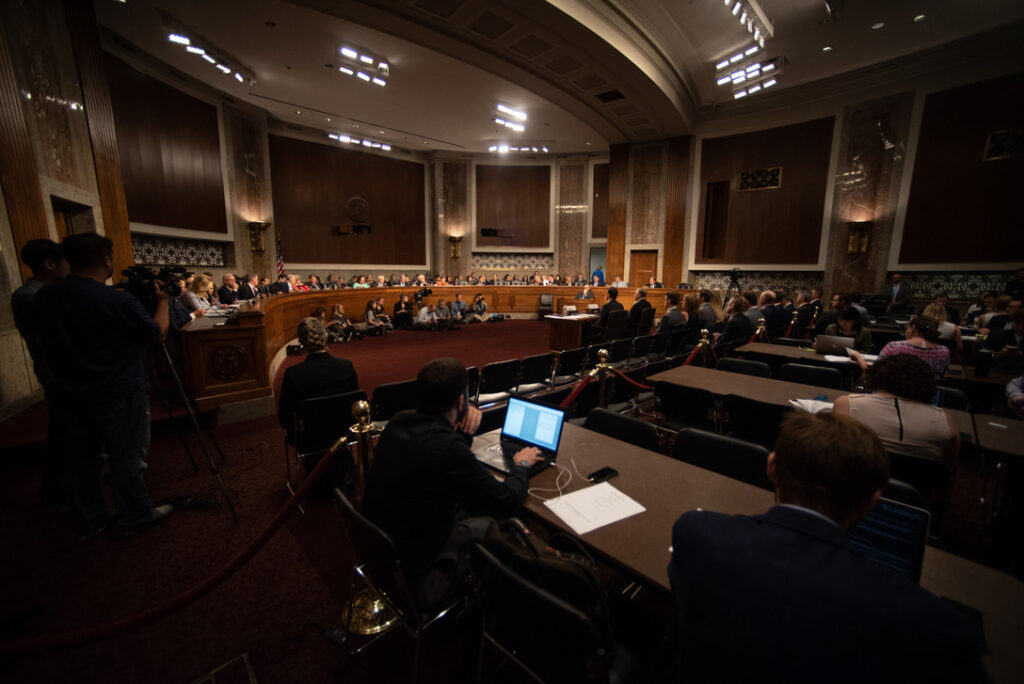 WASHINGTON: Two Democratic senators on Tuesday directed pointed questions at Acting DoD Chief Information Officer Dana Deasy about whether President Trump influenced last week’s award of the $10 billion JEDI cloud contract to Microsoft over presumed favorite Amazon Web Services.
WASHINGTON: Two Democratic senators on Tuesday directed pointed questions at Acting DoD Chief Information Officer Dana Deasy about whether President Trump influenced last week’s award of the $10 billion JEDI cloud contract to Microsoft over presumed favorite Amazon Web Services.
President Trump is well known for his dislike of Jeff Bezos, who owns both Amazon and The Washington Post.
Deasy told the Senate Armed Services Committee during his CIO nomination hearing there was no presidential interference or influence, citing a 50-person multiple-team set of review committees that deliberated independently of each other.
Sen. Jack Reed, top Democrat on the SASC, asked: “The importance of this contract is so critical to our national security that it has to be beyond political engagement. Can you describe what you and others in the department took to ensure the JEDI cloud computing competition was not subject to political influence by the White House or anyone in the Pentagon.”
Deasy responded by describing a review process akin to a blind taste testing of wine or cigars.
“We found approximately 50 government and civilian servants that were experts in cloud computing and compartmentalized and segregated them into teams. At no time did one team have access to what the other team was working on. Probably the most important thing was that we kept the identity of every member of the source selection team anonymous throughout this process.
“(Also), in my discussions with the deputy secretary of Defense and the secretary of Defense at no time throughout this process have I ever shared any proprietary source information with them, nor have I ever divulged when we (arrived at) the conclusion who the awardee was.”
 Deasy added that he was not aware of any officials from the White House personally contacting or trying to contact any members of the source selection groups.
Deasy added that he was not aware of any officials from the White House personally contacting or trying to contact any members of the source selection groups.
Sen. Angus King, an Independent who caucuses with the Democrats, pushed again on any political influence that may have tainted the JEDI award selection. “Mr. Trump’s antipathy to Amazon is well-known. It’s been reported that in the summer of 2018 he instructed General Mattis to, quote, ‘screw Amazon’ out of the opportunity to bid on this contract, and there are many other statements about Amazon and Jeff Bezos. Can you categorically assure us that there was no influence by the White House or the president on the ultimate disposition of this contract?”
Deasy said that the anonymity of the teams and the compartmentalization that allowed each of them to work independently of each other was enough to prevent them from being influenced by the president. In reporting this story, though, we note that no amount of physical segregation of members of the review team would prevent their own political views from coming into play, as the president’s opinions of Amazon are plain to see, as King noted.
“I feel very confident that, at no time were team members that actually took the source selection influenced (by) any external (entity), including the White House,” said Deasy.
The acting CIO explained that it was the members of the review teams themselves that made the final decision to award the JEDI contract to Microsoft. “They actually make the final decision and then they bring that decision to me. I have a chance to ask them questions about it. And then all I do is take that final acquisition decision and inform the deputy and the secretary of the decision taken.”
Deasy also responded to concerns from some senators about JEDI’s single approach to an DoD-wide enterprise cloud, as well as cybersecurity concerns about putting the DoD’s unclassified, secret, and top secret data in one basket.
“Cloud is the foundation on which everything else rides on top of,” he explained to Sen. Mike Rounds. “If we don’t get an enterprise cloud in place our ability to do advanced machine learning, artificial intelligence, next-generation command, control, and communications, and (be able to) secure the department (in) a different way will be very challenging.
“Today we have a multitude of clouds; we are not short, senator, on the number and type of clouds we have. All these clouds were built (however) over the years in disparate siloed manners.’
Deasy said he experienced the inefficiency of siloed operations two months ago on a trip to Afghanistan. There he witnessed troops forced to use one system for data on the adversary, another that helped them decide what actions to take, and a third for situational awareness for friendly assets on the ground.
“One of the uniquenesses of this environment that we’ve created is multi-domain data classes, the idea that we keep unclassified data segregated from classified data all the way up to top secret data. “It is done in a way that allows the warfighter to access what they need from unclassified all the way to top secret in an integrated, interoperable manner.”
That led Sen. Mazie Hirono to express concern about what vulnerabilities might exist by having top secret, classified, and unclassified data in one system managed by one company?.
Deasy said his office kicked off the JEDI program by first asking the National Security Agency and the Central Intelligence Agency for advise on how America’s adversaries conduct cyber operations and how “to ensure that our various classifications of data are secured, segregated, and protected.”
And going forward with JEDI, the DoD will use NSA as a red team attacker for penetration testing on each classification of data, according to Deasy.
Major trends and takeaways from the Defense Department’s Unfunded Priority Lists
Mark Cancian and Chris Park of CSIS break down what is in this year’s unfunded priority lists and what they say about the state of the US military.


























